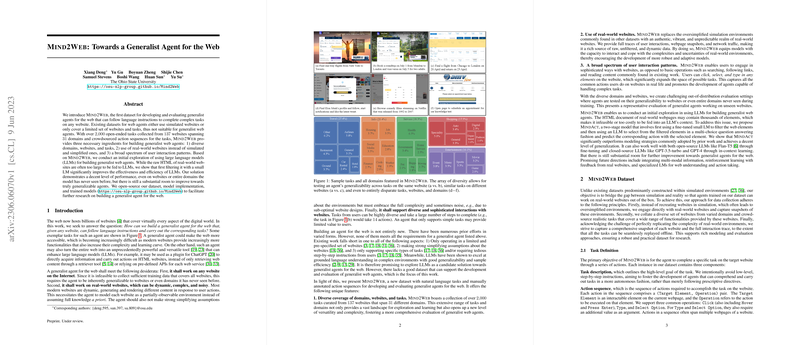Overview of "Mind2Web: Towards a Generalist Agent for the Web"
The paper "Mind2Web: Towards a Generalist Agent for the Web" introduces Mind2Web, a novel dataset designed to foster the development and evaluation of web generalist agents capable of following language instructions to accomplish complex tasks across diverse, real-world websites. This dataset stands out due to its extensive coverage of over 2000 open-ended tasks, sourced from 137 websites across 31 domains, addressing the limitations of existing datasets that rely on simulated websites with limited applicability.
Key Contributions
- Diverse Dataset: Mind2Web offers a remarkable variety spanning an extensive range of tasks from real-world websites, setting a challenging benchmark for evaluating the adaptability and robustness of web agents. The dataset includes detailed, manually annotated action sequences for all tasks, embodying complex user interaction patterns.
- Real-world Relevance: In contrast to oversimplified simulation environments, Mind2Web harnesses the heterogeneity and complexity of real websites, providing a comprehensive platform for developing agents capable of understanding and interacting with authentic web contexts.
- Evaluation Framework: Mind2Web facilitates a detailed understanding of an agent’s ability to generalize across different domains, websites, and tasks. This is key for evaluating the true potential of web agents in diverse, unseen environments.
Methodology: MindAct
An exploratory model, MindAct, is introduced to leverage the dataset, positing a two-tiered approach using LLMs. Initially, a small LM ranks webpage elements, drastically narrowing the candidates for further action. Subsequently, these candidates are fed into a large LM, predicting actions via a multi-choice QA format. This strategy optimizes both the efficiency and efficacy of processing complex web page structures.
Experimental Findings
- Performance Metrics: MindAct achieves substantial success with a step success rate of up to 52.0% in Cross-Task settings and demonstrates solid performance in Cross-Website and Cross-Domain scenarios. However, the challenge of generalizing to unseen environments persists, underlying the need for continued advancement.
- Generalization Analysis: The similarity in performance across Cross-Website and Cross-Domain settings emphasizes that variability in web designs, rather than domain-specific knowledge, is a primary obstacle. This points to opportunities in improving model robustness and adaptability to new websites.
Future Directions
- Incorporating Multimodal Inputs: Exploring the inclusion of visual data from webpages, alongside textual elements, could yield richer context for interactions, enhancing model performance.
- Specialized Model Development: Building smaller, specialized models that comprehend and act in web environments could be more cost-effective and efficient than large LLMs while maintaining adaptability.
- Reinforcement Learning: Utilizing reinforcement learning techniques with real-time web feedback may nurture more nuanced agent behaviors and decision-making frameworks.
Implications
The advancements proposed by Mind2Web carry significant implications for creating web agents that can navigate and interact with web environments with high levels of autonomy. This has potential applications in accessibility and efficiency enhancements, enabling users with various needs to engage with complex web interfaces more effectively. However, the ethical considerations and safety measures in deploying such systems in real-world scenarios must be meticulously evaluated.
Conclusively, this research marks a vital step toward realizing universally adaptable, efficient web-interactive agents, extending the capabilities of LLMs to practical web applications and offering a rich dataset for future exploration in AI-driven web interaction.
